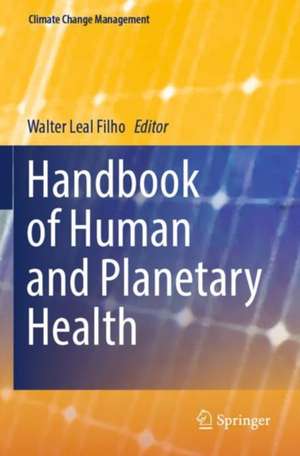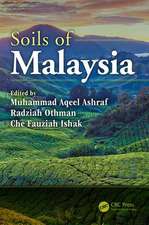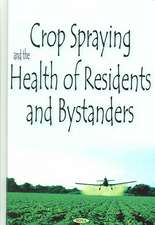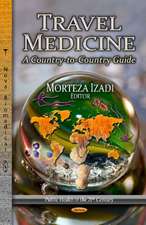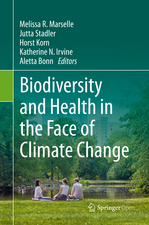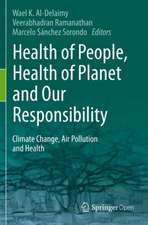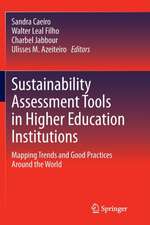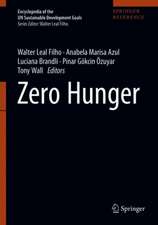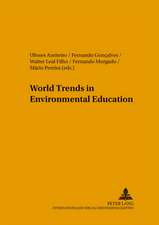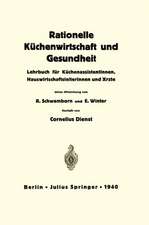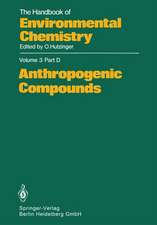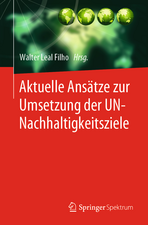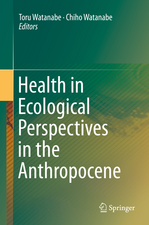Handbook of Human and Planetary Health: Climate Change Management
Editat de Walter Leal Filhoen Limba Engleză Paperback – 8 sep 2023
The year 2015 was a special year in the field of human and planetary health. In that year, the report, produced by the Rockefeller Foundation and the journal The Lancet, called “Safeguarding human health in the Anthropocene epoch: report of The Rockefeller Foundation-Lancet Commission on planetary health” was launched. Also in 2015, the World Health Organization and the Secretariat of the Convention on Biological Diversity published the report “Connecting global priorities: biodiversity and human health: a state of knowledge review” with over 100 contributors, meant to guide future joint actions.
Both documents comprehensively address the need for a better understanding of the connections between human health and ecosystems and the risks associated with damages to the integrity of the planet. The period in which humanity finds itself right now, the Anthropocene, is a risk one since mankind is putting the planet under considerable pressure. These elements have led to the emergence of a new field of research, namely planetary health.
Planetary health seeks to address a very concrete and urgent contemporary problem, namely the need to understand, quantify, and act in order to reverse the effects of human population growth and the acceleration of socioeconomic activities on the environment and, inter alia, the disturbances in the Earth's natural ecosystems and how these, in turn, impact human health and well-being.
Anthropic disturbances in natural ecosystems are characterized by changes in climate, land use, changes in the nitrogen and phosphorus cycle, chemical pollution of soil, water and air, reduction in the availability of drinking water, loss of biodiversity, destruction of the ozone layer, and ocean acidification, among others.
In all these areas, there is a perceived need to document and promote examples of initiatives and good practice, which may change current trends. This book addresses this need. It documents experiences, case studies, and projects which explore the connections between human and planetary health and illustrates examples which show the consequences of ecosystemic disturbances to the health and well-being of humanity, with the emergence of new diseases, worsening of infectious diseases and increase in chronic non-communicable diseases related to the deterioration of the current food system, hyper-urbanization, microbial resistance, climate-led migration and zoonoses, among others.
Planetary health is a new effort to deal with the question of sustainability and human life on the planet under an increasingly integrative, transdisciplinary, and global perspective, since the problems of this planetary crisis cross geopolitical borders and academic boundaries and affect humanity as a whole. This book provides a contribution to this emerging field.
Thanks to its design and the contributions by experts from various areas, it provides a welcome contribution to the literature on planetary health, and it inspires further works in this field.
| Toate formatele și edițiile | Preț | Express |
|---|---|---|
| Paperback (1) | 689.52 lei 38-44 zile | |
| Springer International Publishing – 8 sep 2023 | 689.52 lei 38-44 zile | |
| Hardback (1) | 733.41 lei 3-5 săpt. | |
| Springer International Publishing – 7 sep 2022 | 733.41 lei 3-5 săpt. |
Din seria Climate Change Management
- 20%
 Preț: 879.69 lei
Preț: 879.69 lei - 18%
 Preț: 956.81 lei
Preț: 956.81 lei - 9%
 Preț: 974.60 lei
Preț: 974.60 lei -
 Preț: 393.13 lei
Preț: 393.13 lei - 15%
 Preț: 640.88 lei
Preț: 640.88 lei - 5%
 Preț: 733.41 lei
Preț: 733.41 lei - 18%
 Preț: 1125.23 lei
Preț: 1125.23 lei - 15%
 Preț: 648.24 lei
Preț: 648.24 lei - 18%
 Preț: 958.25 lei
Preț: 958.25 lei - 24%
 Preț: 817.18 lei
Preț: 817.18 lei - 18%
 Preț: 1113.39 lei
Preț: 1113.39 lei - 18%
 Preț: 1123.19 lei
Preț: 1123.19 lei - 15%
 Preț: 654.77 lei
Preț: 654.77 lei - 18%
 Preț: 969.13 lei
Preț: 969.13 lei - 15%
 Preț: 652.64 lei
Preț: 652.64 lei - 15%
 Preț: 644.30 lei
Preț: 644.30 lei - 15%
 Preț: 651.99 lei
Preț: 651.99 lei - 18%
 Preț: 942.63 lei
Preț: 942.63 lei - 24%
 Preț: 851.59 lei
Preț: 851.59 lei - 18%
 Preț: 953.97 lei
Preț: 953.97 lei - 18%
 Preț: 1120.81 lei
Preț: 1120.81 lei - 18%
 Preț: 962.66 lei
Preț: 962.66 lei - 18%
 Preț: 1242.52 lei
Preț: 1242.52 lei - 15%
 Preț: 653.98 lei
Preț: 653.98 lei - 24%
 Preț: 858.45 lei
Preț: 858.45 lei - 15%
 Preț: 651.84 lei
Preț: 651.84 lei - 18%
 Preț: 895.58 lei
Preț: 895.58 lei - 18%
 Preț: 958.73 lei
Preț: 958.73 lei - 18%
 Preț: 1248.68 lei
Preț: 1248.68 lei - 18%
 Preț: 1228.96 lei
Preț: 1228.96 lei - 18%
 Preț: 945.92 lei
Preț: 945.92 lei - 18%
 Preț: 1245.66 lei
Preț: 1245.66 lei - 18%
 Preț: 792.66 lei
Preț: 792.66 lei - 18%
 Preț: 949.73 lei
Preț: 949.73 lei - 18%
 Preț: 1227.99 lei
Preț: 1227.99 lei
Preț: 689.52 lei
Preț vechi: 725.81 lei
-5% Nou
Puncte Express: 1034
Preț estimativ în valută:
131.96€ • 137.26$ • 108.94£
131.96€ • 137.26$ • 108.94£
Carte tipărită la comandă
Livrare economică 10-16 aprilie
Preluare comenzi: 021 569.72.76
Specificații
ISBN-13: 9783031098819
ISBN-10: 3031098811
Pagini: 399
Ilustrații: IX, 399 p. 130 illus., 116 illus. in color.
Dimensiuni: 155 x 235 mm
Greutate: 0.74 kg
Ediția:1st ed. 2022
Editura: Springer International Publishing
Colecția Springer
Seria Climate Change Management
Locul publicării:Cham, Switzerland
ISBN-10: 3031098811
Pagini: 399
Ilustrații: IX, 399 p. 130 illus., 116 illus. in color.
Dimensiuni: 155 x 235 mm
Greutate: 0.74 kg
Ediția:1st ed. 2022
Editura: Springer International Publishing
Colecția Springer
Seria Climate Change Management
Locul publicării:Cham, Switzerland
Cuprins
1. Modelling of Human Activities on Planetary Systems for Sustainable Living.- 2. Sustainable management model for native flora in the face of climate change and planetary health. 3. Entomophagy and the Nexus Between Human and Planetary Health.- 4. Future of flood control projects in Bangladesh considering the health of its floodplain and inhabitants.- 5. Ways to Protect and Preserve Human and Planetary Health through the Water, Sanitation and Hygiene Sector in Schools.
Notă biografică
Walter Leal Filho (BSc, PhD, DSc, DPhil, DEd, DTech, DL, DLitt) is a Senior Professor and Head of the Research and Transfer Centre "Sustainable Development and Climate Change Management” at the Hamburg University of Applied Sciences in Germany, and Chair of Environment and Technology at Manchester Metropolitan University, UK. He also chairs the International Climate Change Information and Research Programme (ICCIRP).
Professor Leal Filho has written, co-written, edited or co-edited more than 600 publications, including books, book chapters and papers in refereed journals. This includes the African Handbook of Climate Change Adaptation, a 4-volumes publication illustrating the means via which climate change adaptation is being implemented in Africa today (https://link.springer.com/book/10.1007/978-3-030-45106-6) and the Handbook of Climate Change Management: Research, Leadership, Transformation (https://link.springer.com/referencework/10.1007/978-3-030-22759-3), a 6-volumes compendium on the theory and practice of climate change management. With 229 chapters, to which over 500 authors from across all geographical regions have contributed, this is the largest non-publicly funded editorial project on climate change adaptation ever produced.
Professor Leal Filho has written, co-written, edited or co-edited more than 600 publications, including books, book chapters and papers in refereed journals. This includes the African Handbook of Climate Change Adaptation, a 4-volumes publication illustrating the means via which climate change adaptation is being implemented in Africa today (https://link.springer.com/book/10.1007/978-3-030-45106-6) and the Handbook of Climate Change Management: Research, Leadership, Transformation (https://link.springer.com/referencework/10.1007/978-3-030-22759-3), a 6-volumes compendium on the theory and practice of climate change management. With 229 chapters, to which over 500 authors from across all geographical regions have contributed, this is the largest non-publicly funded editorial project on climate change adaptation ever produced.
Textul de pe ultima copertă
This book contains a set of papers which explore the subject matter of human and planetary health at various angles
The year 2015 was a special year in the field of human and planetary health. In that year, the report, produced by the Rockefeller Foundation and the journal The Lancet, called “Safeguarding human health in the Anthropocene epoch: report of The Rockefeller Foundation-Lancet Commission on planetary health” was launched. Also in 2015, the World Health Organization and the Secretariat of the Convention on Biological Diversity published the report “Connecting global priorities: biodiversity and human health: a state of knowledge review” with over 100 contributors, meant to guide future joint actions.
Both documents comprehensively address the need for a better understanding of the connections between human health and ecosystems and the risks associated with damages to the integrity of the planet. The period in which humanity finds itself right now, the Anthropocene, is a risk one since mankind is putting the planet under considerable pressure. These elements have led to the emergence of a new field of research, namely planetary health.
Planetary health seeks to address a very concrete and urgent contemporary problem, namely the need to understand, quantify, and act in order to reverse the effects of human population growth and the acceleration of socioeconomic activities on the environment and, inter alia, the disturbances in the Earth's natural ecosystems and how these, in turn, impact human health and well-being.
Anthropic disturbances in natural ecosystems are characterized by changes in climate, land use, changes in the nitrogen and phosphorus cycle, chemical pollution of soil, water and air, reduction in the availability of drinking water, loss of biodiversity, destruction of the ozone layer, and ocean acidification, among others.
In all these areas, there is a perceived need to document and promote examples of initiatives and good practice, which may change current trends. This book addresses this need. It documents experiences, case studies, and projects which explore the connections between human and planetary health and illustrates examples which show the consequences of ecosystemic disturbances to the health and well-being of humanity.
Thanks to its design and the contributions by experts from various areas, it provides a welcome contribution to the literature on planetary health, and it inspires further works in this field.
The year 2015 was a special year in the field of human and planetary health. In that year, the report, produced by the Rockefeller Foundation and the journal The Lancet, called “Safeguarding human health in the Anthropocene epoch: report of The Rockefeller Foundation-Lancet Commission on planetary health” was launched. Also in 2015, the World Health Organization and the Secretariat of the Convention on Biological Diversity published the report “Connecting global priorities: biodiversity and human health: a state of knowledge review” with over 100 contributors, meant to guide future joint actions.
Both documents comprehensively address the need for a better understanding of the connections between human health and ecosystems and the risks associated with damages to the integrity of the planet. The period in which humanity finds itself right now, the Anthropocene, is a risk one since mankind is putting the planet under considerable pressure. These elements have led to the emergence of a new field of research, namely planetary health.
Planetary health seeks to address a very concrete and urgent contemporary problem, namely the need to understand, quantify, and act in order to reverse the effects of human population growth and the acceleration of socioeconomic activities on the environment and, inter alia, the disturbances in the Earth's natural ecosystems and how these, in turn, impact human health and well-being.
Anthropic disturbances in natural ecosystems are characterized by changes in climate, land use, changes in the nitrogen and phosphorus cycle, chemical pollution of soil, water and air, reduction in the availability of drinking water, loss of biodiversity, destruction of the ozone layer, and ocean acidification, among others.
In all these areas, there is a perceived need to document and promote examples of initiatives and good practice, which may change current trends. This book addresses this need. It documents experiences, case studies, and projects which explore the connections between human and planetary health and illustrates examples which show the consequences of ecosystemic disturbances to the health and well-being of humanity.
Thanks to its design and the contributions by experts from various areas, it provides a welcome contribution to the literature on planetary health, and it inspires further works in this field.
Caracteristici
Presents interdisciplinary outputs on best practice on human and planetary health Provides documentation of projects, innovative methods and tools, and research outputs Covers a wide range of disciplines
